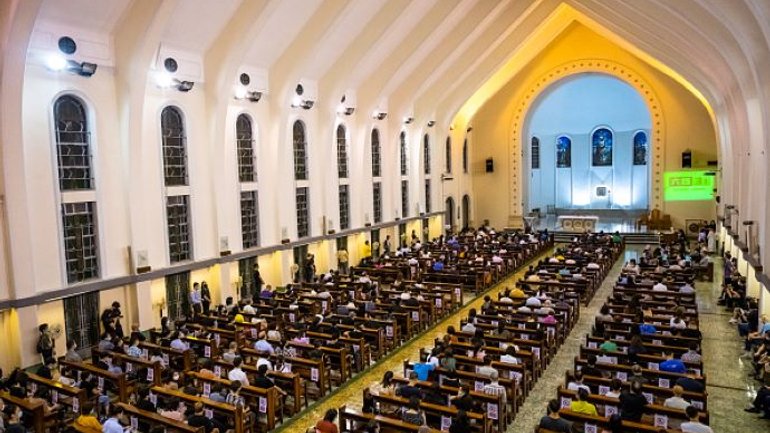One in three countries lacks religious freedom

The 2023 World Religious Freedom Report (RFR), published on June 22, 2023 by Aid to the Church in Need (ACN), underlines the accelerating threats and trends against this right, revealing that persecution on the grounds of faith has worsened overall, and impunity has increased.
The study covers the period between January 2021 and December 2022, and is the only non-governmental report that analyzes compliance and violations worldwide of all faith groups’ rights, as secured in Article 18 of the Universal Declaration of Human Rights.
The report finds that discrimination and persecution are clearly noticeable in 61 countries, and that in 49 of them, it is the government that persecutes or even murders its own citizens on religious grounds, with scarcely any reaction from the international community. Even majority religious communities are now under threat.
Religious persecution has worsened
According to the RFR map, 28 states are marked in red as “hot countries,”indicating persecution anddenoting the most dangerous places in the world for practicing religion freely, and 33 are orange, indicating high levels of discrimination. In 47 of these countries, the situation has worsened since the last report was published; things have improved in only nine.
One of the main conclusions of ACN’s report is that conditions for minority religious communities are increasingly dire, and in some cases, they face the threat of extinction due to a combination of terrorism, attacks on their cultural heritage, and subtler measures, like anti-conversion laws, manipulation of electoral rules ,and financial restrictions. However, there are also cases of majority religious communities being persecuted, in countries like Nicaragua and Nigeria.
The report also notes that over the past two years, there has been a global increase in power and scope of authoritarian governments and fundamentalist leaders who are both jealous and fearful of the spiritual authority and mobilization capacity of religious communities. This has had a deadly effect on religious freedom. Impunity is now a constant around the world, and in 36 countries (18 percent), attackers are rarely, if ever, prosecuted for their crimes.
The silence of the international community contributes to the culture of impunity for regimes considered strategically important for the West, such as China and India, which are not subject to international sanctions or any other consequences for violations of religious freedom. The same applies to countries like Nigeria and Pakistan.
Africa continues to be the most violent continent, with an increase in jihadist attacks making the state of religious freedom even more alarming. Almost half of the “hot countries” in the RFR map (13 out of 28) are in Africa. The concentration of jihadist activity is especially evident in the Sahel region, around Lake Chad, Mozambique, and Somalia, and is spreading to neighboring countries, many of which remain under observation, having suffered Islamist attacks on their borders.
China and North Korea remain the two countries in Asia with the worst record of human rights violations, including religious freedom, with the state exercising totalitarian control through surveillance and extreme measures of repression.
The RFR also pays close attention to India, where persecution levels are on the rise, with the imposition of a dangerous ethno-religious nationalism that is harmful to religious minorities. Anti-conversion laws have been approved, or are under consideration, in 12 of India’s 28 states, carrying penalties of up to 10 years in prison. Furthermore, these laws include financial benefits for those who convert, or revert, to the majority religion.
Incidents of forced religious conversion, abductions, and sexual violence (including sexual slavery) have not decreased during the two-year period under review; in fact, they remain largely ignored by local law enforcement, as is the case in Pakistan, where young Christian and Hindu girls are often abducted and forced into marriage. Besides the gross violation of their human rights, these practices also limit the growth of their religious communities.
The RFR also highlights the serious internal crises that are occurring in Muslim communities all over the world. On the one hand, many young Muslims continue to be attracted to Islamist terrorist networks, but on the other, especially in the Middle East, there are signs of a widespread secularization. In Iran, for example, surveys indicate that 47 percent of the population claimed no religious affiliation, and only 32 percent identified as Shiite during the recent Iranian women’s “hijab revolution.”
The RFR draws attention to concerns about limited freedom of thought, conscience, and religion in countries that belong to the Organization for Security and Cooperation in Europe (OSCE). Over the past two years, the West has shifted from a climate of “polite persecution” toward those who openly live and express their faith to one of “cancel culture” and “enforced speech,” with strong social pressure to conform to current ideological trends.
On a positive note, the report points out an increase in interreligious dialogue initiatives, as well as the joyful return to unrestricted religious celebrations in many countries after the COVID-19 lockdowns.
Regina Lynch, recently appointed as executive president of ACN International, explains that the main purpose of this report is to “motivate people to get involved and help those suffering from religious persecution through prayer, sharing information, speaking up for victims, engaging politicians, and keeping informed about the reality on the ground in different parts of the world.”
“The ACN Religious Freedom in the World Report seeks only to collate information and provide analysis of the abuse of this fundamental human right worldwide. It is a tool. The tool is only as good as those who take it up, share it with others, and work to effect change,” says Lynch.









